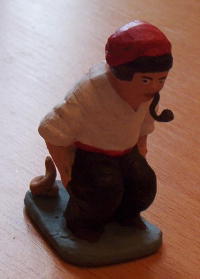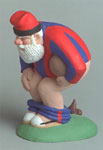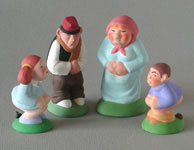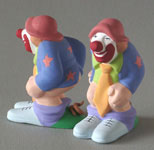Friday, December 24, 2004
A Very AmCop Christmas
I got back not long ago from a trip to Barcelona. The Catalunyans love Christmas, and as you’d expect, the streets and public spaces of the city are decked out with "Bones Festes" signs, festive lights, you name it.
Plus, nativity scenes, lots of them, in public spaces, storefront windows, churches.
The Catalunyan nativity scene is a little different from our own, though.
The setting is a manger, of course. Barnyard animals, three wise men, Joseph, Mary, and baby Jesus.
But there’s also "El Caganer."
"El Caganer"? Is that a fourth wise man, an extra stable attendant, perhaps a Catalunyan nobleman?
In fact, "caganer" in English is "crapper." As in, a guy (typically a shepherd with a little red cap) crouching, with trou dropped, taking a dump.

Sometimes he's off to the side of the nativity scene, sometimes hiding behind a tree, sometimes right there in the manger, next to the Holy Family and baby Jesus.
"Caganer" figurines of all shapes, sizes, and styles are for sale in virtually every Christmas shopping fair in any marketplace in Catalunya (like Barcelona’s Santa Llúcia market, in front of the old cathedral) and are featured in just about every nativity scene you come across.

Explanations abound.
1. Some say the crapper is a symbol of historical Catalunyan defiance of the fascist regime of Generalisimo Francisco Franco. (Franco was an ardent Catholic, so the crapper symbolically craps on Franco’s religion.)
2. Others describe him as a Santa Claus-like figure, who bestows gifts on the children in his own scatalogical way.

(A child is presented with a wooden log swaddled in blankets. When the child is shooed out of the room, the "caganer" magically appears, performs his singular function, and out comes a wonderful gift, which then replaces the log in the blankets.)
3. There’s the Catalunyan secularist/humanist explanation which has it that, even while the "greatest event in human history was happening someone, somewhere, was having a crap."
4. Some say that the crapping shepherd symbolizes fertility, that he "represents the re-fertilization of the ground in the winter, in the hope of fertility in the spring" and thus "symbolizes fertility in general and hence good luck."

5. Then there’s this definitive explanation, from the website of an organization devoted, it seems, to the manufacture of ceramic crappers in a multiplicity of poses, costumes, themes, and styles.
Bones Festes and Happy New Year!

President Bush delivers his Christmas message to the world.
Plus, nativity scenes, lots of them, in public spaces, storefront windows, churches.
The Catalunyan nativity scene is a little different from our own, though.
The setting is a manger, of course. Barnyard animals, three wise men, Joseph, Mary, and baby Jesus.
But there’s also "El Caganer."
"El Caganer"? Is that a fourth wise man, an extra stable attendant, perhaps a Catalunyan nobleman?
In fact, "caganer" in English is "crapper." As in, a guy (typically a shepherd with a little red cap) crouching, with trou dropped, taking a dump.

Sometimes he's off to the side of the nativity scene, sometimes hiding behind a tree, sometimes right there in the manger, next to the Holy Family and baby Jesus.
"Caganer" figurines of all shapes, sizes, and styles are for sale in virtually every Christmas shopping fair in any marketplace in Catalunya (like Barcelona’s Santa Llúcia market, in front of the old cathedral) and are featured in just about every nativity scene you come across.

Explanations abound.
1. Some say the crapper is a symbol of historical Catalunyan defiance of the fascist regime of Generalisimo Francisco Franco. (Franco was an ardent Catholic, so the crapper symbolically craps on Franco’s religion.)
2. Others describe him as a Santa Claus-like figure, who bestows gifts on the children in his own scatalogical way.

(A child is presented with a wooden log swaddled in blankets. When the child is shooed out of the room, the "caganer" magically appears, performs his singular function, and out comes a wonderful gift, which then replaces the log in the blankets.)
3. There’s the Catalunyan secularist/humanist explanation which has it that, even while the "greatest event in human history was happening someone, somewhere, was having a crap."
4. Some say that the crapping shepherd symbolizes fertility, that he "represents the re-fertilization of the ground in the winter, in the hope of fertility in the spring" and thus "symbolizes fertility in general and hence good luck."

5. Then there’s this definitive explanation, from the website of an organization devoted, it seems, to the manufacture of ceramic crappers in a multiplicity of poses, costumes, themes, and styles.
CAGANERSFor "caganers" in all their varied and sundry forms, visit the galleries here. Or here.
The " Castellers ", witches and firs of Anna Maria Pla, have two things in common: the made kneel positions of their bodies and the excrements in spiral form " that pay the ground, and bring luck to the home until next Christmas " explains Anna Maria.These peculiar figures are not nothing else that three of more than 50 models of "caganers" that produces the factory. To the conventional old Catalan man with barretina (tipical red hat) and canvas shoes, all type of peculiar clubs has been added him. Anna Maria Pla shows with pride his long collection, in that they appear devils with wings, papas Noel, grandmothers, navigators, angels, nuns, clergyman and fans of Barça and the Español, (spanish football teams).
Bones Festes and Happy New Year!

President Bush delivers his Christmas message to the world.


